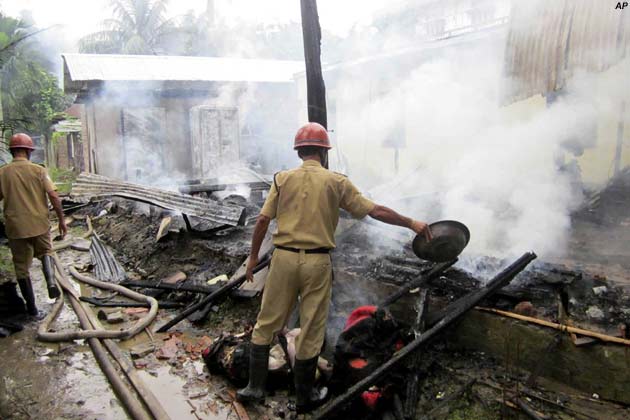
New Delhi, August 20: As the nation celebrates Eid on Monday, riot-hit Assam is on high alert. Security has been stepped up across the state, especially in the sensitive districts of Kokrajhar, Dhubri and Chirang that witnessed a spate of clashes between the Bodo tribal groups and Muslims at the end of last month.
While the actual reason for the sudden breakout of violence in the lower regions of Assam is unknown, the state government is not taking any chances as sporadic violence continues.
One hundred companies of security forces have been deployed in the Muslim-dominated sensitive zones of the Bodoland Territorial Autonomous Districts ahead of Eid.
Authorities have appealed to Muslims living in relief camps to either offer their Eid prayers within the relief camps or go to the nearest Idgah.
Police authorities will also be monitoring the Khudba speeches made by the Imams and religious personalities after the namaz.
Eight companies of additional forces have been deployed between Srirampur near the Assam-Bangladesh border and Guwahati.
In Bangalore, which witnessed a mass exodus by Northeast Indians in the past three days following SMSes warning of retaliatory attacks against them, heavy security is in place. Nearly 17,000 policemen, 3 CRPF companies and 3 Rapid Action Force platoons are spread across the city.
Guilty must be punished: Sonia Gandhi
UPA chairperson and Congress president Sonia Gandhi on Sunday warned of swift action against people behind the violence in Assam and those "spoiling" harmony in the wake of the exodus of Northeast Indians in some states. "What is happening to Northeast Indians is shameful. The guilty should be punished," she said.
Sonia said the country belonged to all Indians and that they have a right to live in any part of the country. She also expressed concern on Assam violence and said, "Whatever happened in Assam is a matter of great sorrow and concern. Legal action should happen swiftly against those responsible for the incident, whoever they are."
Panic subsides, fear still remains
The panic among Indians from Northeast seems to have subsided as the sale of train and air tickets for destinations there has drastically come down.
Lesser crowds have been seen in the Guwahati-bound trains from Mumbai and Bangalore. Officials in Mumbai say there were a few empty seats in the Guwahati Express.
The Bangalore railway station also saw lesser crowds. However, over 30,000 Indians from the Northeast have already left the city after rumours of retaliatory attacks after Assam violence spread in the city.
The Karnataka government is keeping a close watch on the law and order situation in the state. Five companies of paramilitary force and the state police conducted flag march in areas where Northeast Indians are in majority - Austin Town, Audugodi and Koramangala.
Pakistan remains defiant, demands proof
Home Secretary RK Singh on Saturday had said that the morphed images of Assam violence that were circulated online for creating panic among Northeast Indians in some southern states originated in Pakistan.
Pakistan, however, rejected the allegations saying RK Singh's statement was "careless."
On Sunday, Union Home Minister Sushil Kumar Shinde called up Pakistan Interior Minister Rehman Malik and sought his cooperation in checking the misuse of social networking sites hurting communal sentiments in India.
Malik in response said that if India can produce evidence proving the rumours originated in Pakistan, they will surely take action.





Comments
Add new comment